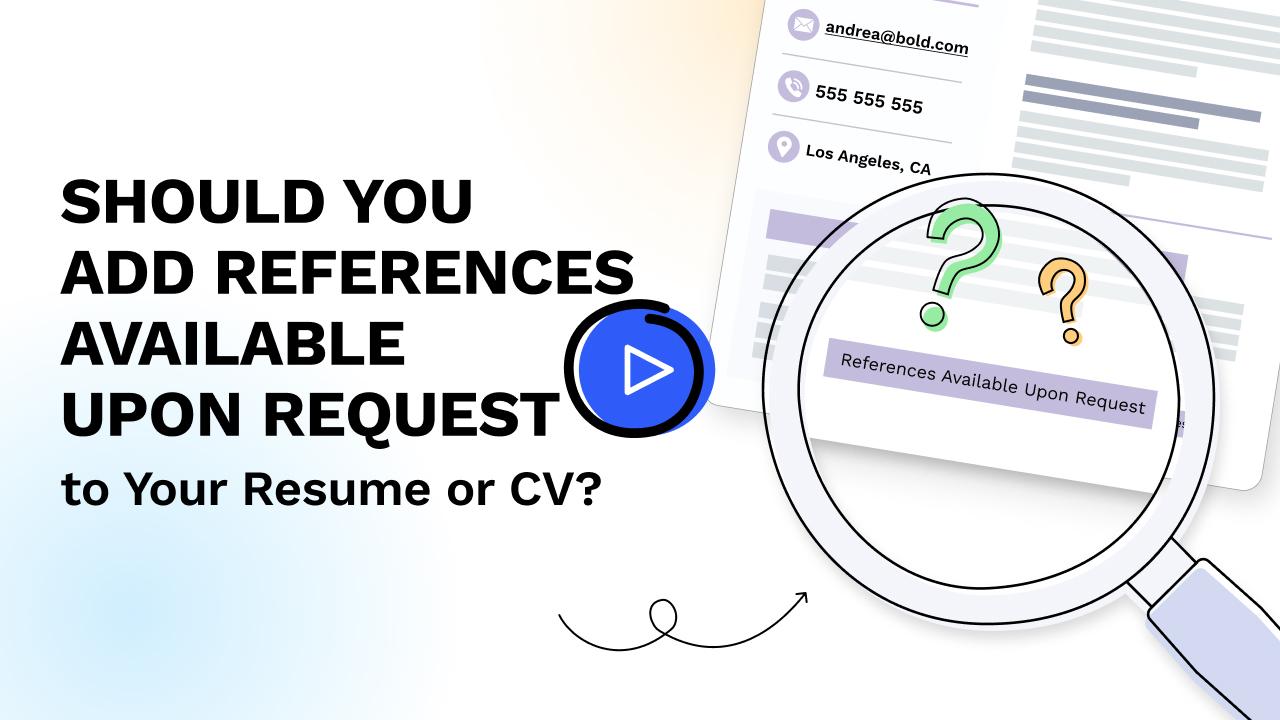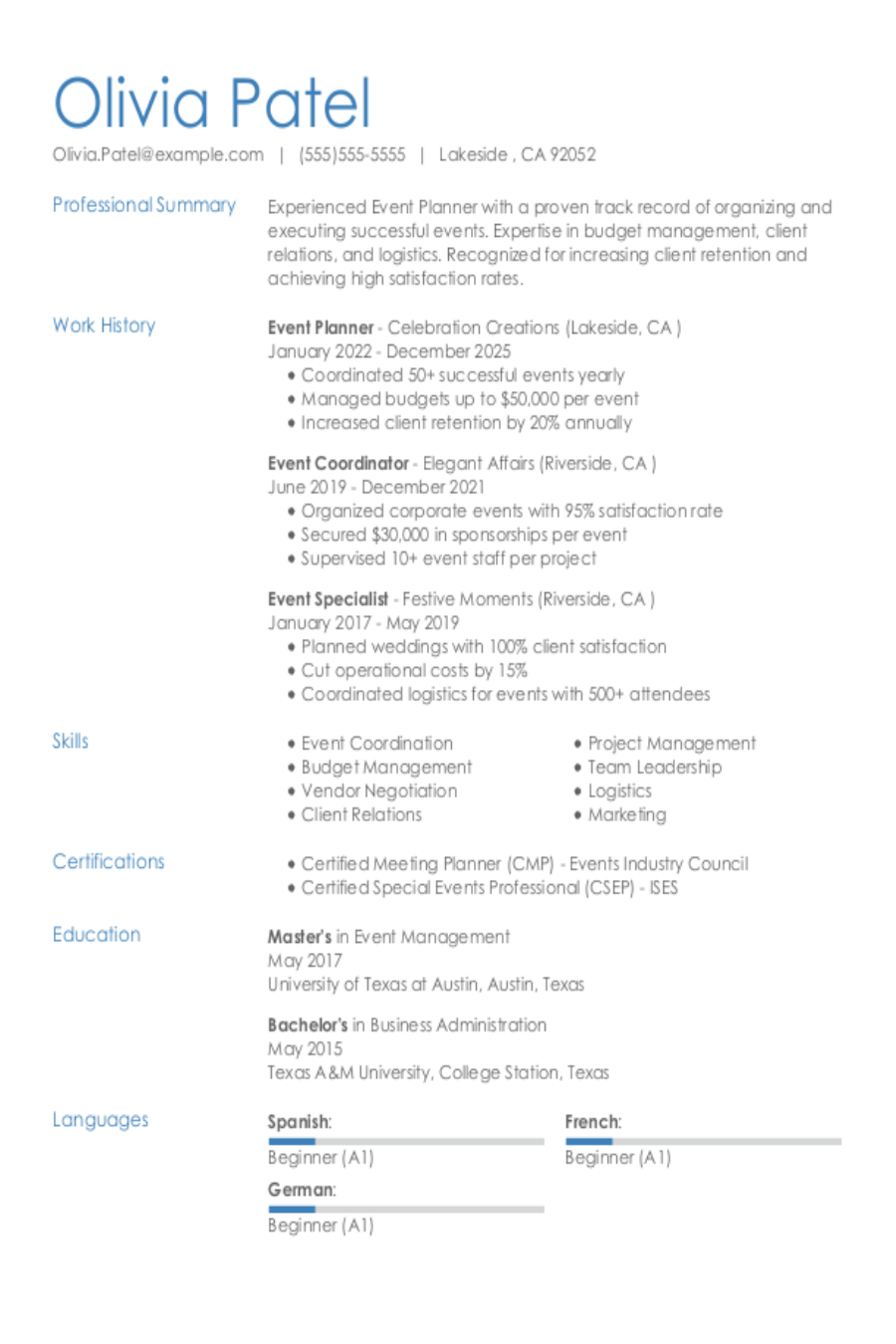Table of contents
You’re putting the finishing touches on your resume when the thought occurs to you — should I add references available upon request?
You’ve heard mixed things about this phrase. Some say it’s old-fashioned and could make you look bad. On the other hand, you’re excited to share your references and — let’s admit it — the line helps you fill out the page until you’ve got more experience.
Well, we’re here to answer your questions with this guide, including:
- What references available upon request means.
- How to write a references list.
- Whether you should add the phrase to your CV or resume.
- Where to put the phrase (if you decide to add it).

What Does References Available Upon Request Mean?
References available upon request is a phrase commonly found at the bottom of a resume. It is meant to communicate that the candidate has a list of people who can back up their candidacy.
But in 2024, is this phrase effective or simply distracting business jargon? Keep scrolling for the answer.
Choose from 40+ formats and templates to build your resume now.
Should You Add References Available Upon Request to a Resume?
While the phrase once served an important purpose, you no longer need to say references available upon request on your resume. Recruiters themselves label the extra sentence as “wasteful.”
The term is outdated. Here are three reasons why saying references available upon request doesn’t belong in your resume outline:
- Most employers already know they can ask you for professional references if they want them. There’s no need to state the obvious.
- The phrase may make the employer wonder why you don’t simply provide the references — do you have something to hide?
- Your resume should be concise, no more than one to two pages. This line is a waste of valuable real estate.
The final point is important. It’s only one sentence, but you can use the extra space to expand your resume profile or objective statement.
If you eliminate the line, how should you deal with your references? Create a references list. We can show you how to do that.
How to Write a References List
Since most companies check references only if you’re being considered for the role, save your resume space and instead be prepared with a references list. That way, when you’re asked for references, you’ll be ready to go.
Creating a separate list is much better than trying to jam references into your perfectly constructed resume. And, if your interviewer asks for the list, you can give your references a heads up.
Now, here’s the information you should list with each reference:
- Name
- Position
- Company name
- Phone number
- Email address
Next, let’s consider whether this advice would be any different when it comes to a CV.
Should You Add References Available Upon Request to a CV?
While CVs and resumes are different, they are similar in that you don’t need to say references available upon request on your CV. Although CVs are longer, more exhaustive documents, that doesn’t change the fact that a hiring manager knows how to ask for references if they’re interested.
With that out of the way, let’s consider one more question — where is this sentence supposed to go in the first place?
Where Do You Put References Available Upon Request on a Resume?
If you decide to put references available upon request on your resume, there’s really only one place the line should go on most resume layouts: at the bottom.
Whether you’re working in Microsoft Word or Google Docs, the bottom is the perfect location for this line. It can function as a final note for the reader to follow up on after they’ve read your resume.
Speaking of, do you need more help making your resume? Whether you’re just starting or need to revamp an existing design, a AI Resume Builder is a smart option.
Choose from dozens of professional, field-tested resume templates to edit in the builder, and browse thousands of resume examples for all sorts of jobs. A builder is simply an easy way to save time on your resume so you can spend more time finding your next job.
Was this information about Should You Add References Available Upon Request To Your Resume Or CV? helpful? Let us know!
Don is a Certified Professional Resume Writer (CPRW) with more than 10 years’ experience creating digital content, including four years helping job seekers develop their careers. He holds an M.S. in Journalism from Northwestern University.
More resources

How to Make a Canadian Resume (Format, Template + Examples)
Creating a Canadian resume is key to getting a job in Canada. ...

How to Write a Resume for an Internal Position (Guide + Examples)
Ready for a new role within the same company? We ll help you...

The Great Workplace Reckoning: How 2025 Burned Out Workers & What’s Next for 2026
Resume Now provides a look inside the burnout pay and ethics...

Event Planning Resume: Examples & Templates
Build & download your Event Planning resume in a few simple st...

Chemical Engineering Resume: Examples & Templates
Build & download your Chemical Engineering resume in a few sim...

Biology Resume: Examples & Templates
Build & download your Biology resume in a few simple steps. Br...
